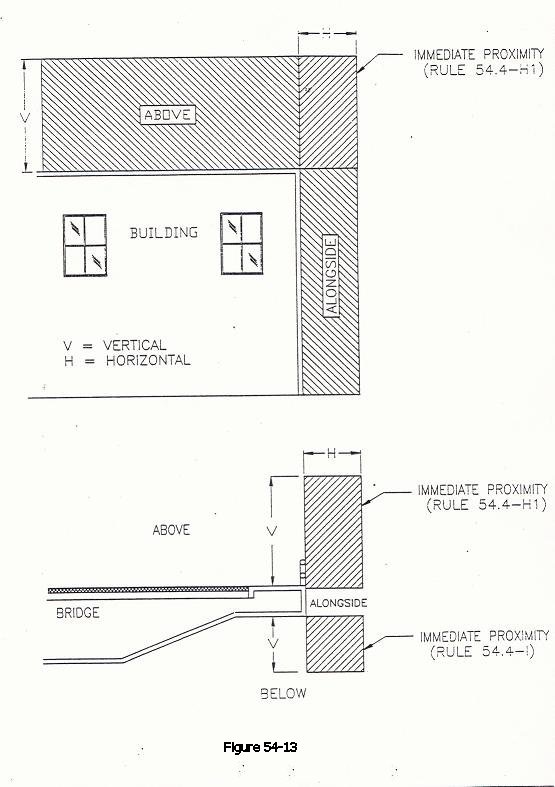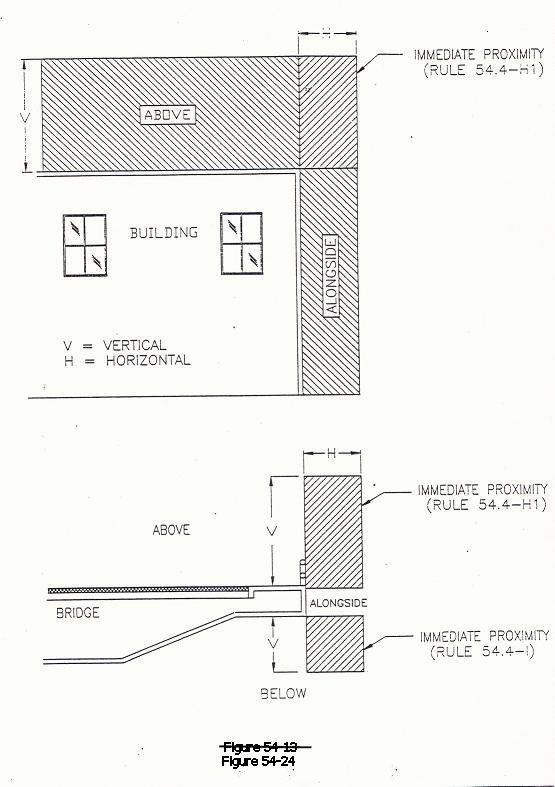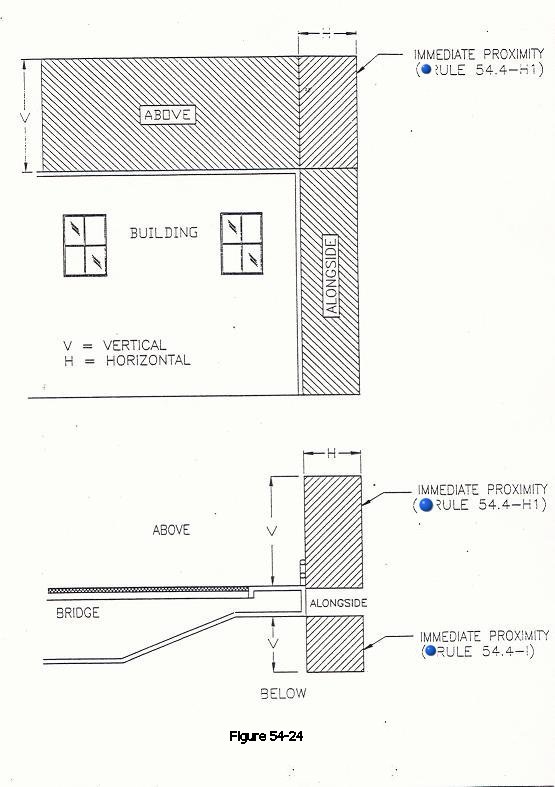
Original Version
Rule 54.4-I
54.4-I. Below, Alongside, Through, or Immediate Proximity to Bridges, Viaducts or Similar Structures
Unprotected supply conductors which pass unattached below or in immediate proximity to bridges, viaducts or similar structures shall be maintained at clearances above ground and walkways as specified in Table 1, Cases 1 to 6 inclusive; at clearances from walls and underneath parts of such structures as specified in Table 1, Case 7; and at clearances from conductors of other classifications as specified in Table 2, Case 3. The horizontal clearance (Table 1, Case 7) shall be maintained until the vertical clearance (Table 1, Case 6) is attained (see Fig. 54-13).
Conductors of 0-22,500 volts, passing below or through bridges, viaducts or
similar structures, may be attached thereto in accordance with the provision of
Rule 54.4-H2. Warning signs of a substantial character with letters not
less than 3 inches in height reading “High Voltage” for voltages in excess of
750 volts shall be placed conspicuously on each crossarm or structural member
supporting the conductors.
In lieu of these requirements for unprotected conductors, supply conductors
which cross below bridges, viaducts or similar structures shall be enclosed in
grounded metal conduit or in other effectively grounded sheath or grounded
shield suitably protected from mechanical injury.

Strikeout and Underline Version
Rule 54.4-I
54.4-I. Below, Alongside, Through, or Immediate Proximity to Bridges, Viaducts or Similar Structures
Unprotected supply conductors
which pass unattached below or in immediate proximity to bridges, viaducts or
similar structures shall be maintained at clearances above ground and walkways
as specified in Table 1, Cases 1 to 6 inclusive; at clearances from walls and
underneath parts of such structures as specified in Table 1, Case 7; and at
clearances from conductors of other classifications as specified in Table 2,
Case 3. The horizontal clearance (Table
1, Case 7) shall be maintained until the vertical clearance (Table 1, Case 6)
is attained (see Fig. 54-1324).
Conductors of 0-22,500 volts, passing below or through bridges, viaducts or
similar structures, may be attached thereto in accordance with the provision of
Rule 54.4-H2. Warning signs of a substantial character with letters not
less than 3 inches in height reading “High Voltage” for voltages in excess of
750 volts shall be placed conspicuously on each crossarm or structural member
supporting the conductors.
In lieu of these requirements for unprotected conductors, supply conductors
which cross below bridges, viaducts or similar structures shall be enclosed in
grounded metal conduit or in other effectively grounded sheath or grounded
shield suitably protected from mechanical injury.

Final Version
Rule 54.4-I
54.4-I. Below, Alongside, Through, or Immediate Proximity to Bridges, Viaducts or Similar Structures
Unprotected supply conductors which pass unattached below or in immediate proximity to bridges, viaducts or similar structures shall be maintained at clearances above ground and walkways as specified in Table 1, Cases 1 to 6 inclusive; at clearances from walls and underneath parts of such structures as specified in Table 1, Case 7; and at clearances from conductors of other classifications as specified in Table 2, Case 3. The horizontal clearance (Table 1, Case 7) shall be maintained until the vertical clearance (Table 1, Case 6) is attained (see Fig. 54-24).
Conductors of 0-22,500 volts, passing below or through bridges, viaducts or
similar structures, may be attached thereto in accordance with the provision of
Rule 54.4-H2. Warning signs of a substantial character with letters not
less than 3 inches in height reading “High Voltage” for voltages in excess of
750 volts shall be placed conspicuously on each crossarm or structural member
supporting the conductors.
In lieu of these requirements for unprotected conductors, supply conductors
which cross below bridges, viaducts or similar structures shall be enclosed in
grounded metal conduit or in other effectively grounded sheath or grounded
shield suitably protected from mechanical injury.
